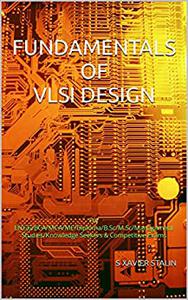
FUNDAMENTALS OF VLSI DESIGN by S XAVIER STALIN
English | 2022 | ISBN: N/A | ASIN: B09VNK8Z1S | 267 pages | EPUB | 4.49 Mb
Silicon (Si), a semiconductor, forms the basic starting material for most integrated circuits. A Metal-Oxide-Semiconductor (MOS) structure is created by superimposing several layers of conducting and insulating materials to form a sandwich-like structure. These structures are manufactured using a series of chemical processing steps involving oxidation of the silicon, selective introduction of dopants, deposition and etching of metal wires and contacts. Transistors are built on nearly flawless single crystals of silicon, which are available as thin flat circular wafers of 15-30 cm in diameter. CMOS technology provides two types of transistors (also called devices): an n-type transistor (nMOS) and a p-type transistor (pMOS). Transistor operation is controlled by electric fields so the devices are also called Metal Oxide Semiconductor Field Effect Transistors (MOSFETs) or simply FETs. Cross-sections and symbols of these transistors are shown in Figure below. The n+ and p+ regions indicate heavily doped n-type or p-type silicon.



